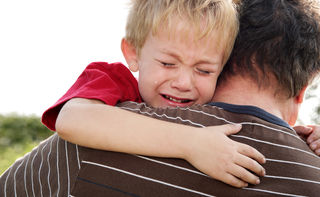Resilience
A Lament That Remains
How to help your child become resilient if their parent dies.
Posted April 25, 2017

Prince Harry, along with Prince William and his wife, Catherine, recently announced their support of mental health charities with the intent to "change the conversation of mental health."
Prince Harry spoke in a podcast about how he coped with the untimely death of his mother, Princess Diana, when he was just 12. Bryony Gordon recorded the podcast at Kensington Palace with him. Prince Harry opens the conversation by saying, "I spent most of my life saying 'I'm fine.'" He goes on to talk about losing his mum "in a public platform" and says he "buried his head in the sand" for many years. He adds that three years ago, his brother encouraged him to examine his grief at a deeper level. Prince Harry reveals, “I can safely say that losing my mum at the age of 12, and therefore shutting down all of my emotions for the last 20 years, has had a quite serious effect on not only my personal life but my work as well."
Losing a parent when you are a child does impact your adult life. While I've written a book about healing as a widow (I was widowed in 2007), I seldom write about losing my father as a young child. In 1979, my father died after a long and devastating battle with cancer. I was two weeks shy of turning five. The night he died, I left the hospital with my paternal grandparents and my mother, not knowing that the entire trajectory of my life had changed. Until that moment, I had had no experience with death; both sets of my grandparents were still alive.
As a child you outgrow many things. You outgrow fears, for example — the fear of darkness or jumping off a diving board or entering a new classroom — but you don't outgrow the death of a parent. It is something that remains with you. This doesn't mean you can't live a healthy life and achieve great things, but it is a different path. As an only child, I didn't have a sibling to share my grief with, so it was an isolating experience, and school was no exception. When classroom activities integrated fathers, my stomach coiled in a knot. In kindergarten, when my teacher said we needed to draw a picture of our father for an early Father's Day present, I just froze. Bewilderment. I couldn't remember exactly what my father looked like, and I also knew I had no one to give the drawing to.
I've lived more of my life without my father than I did with him. I know I think about some things differently than most of my peers. When I turned 31, I remember thinking, "I've outlived my father" — he never celebrated his 31st birthday. To some this may sound like an obscure affliction. However, I know that other adults who lost a parent early on can relate to this and similar sentiments. Two evenings ago, a woman was sharing plans for her father's 75th birthday party. Before I could comment, there was a lump in my throat. It occurred to me that I wouldn't be able to do this for my father. Moments like these still catch me off guard and give me pause.
If you are reading this piece because you are a parent of or work with children who have lost a parent, and you are wondering how can you relate to a child and teach him or her to become resilient, I have a few suggestions for you, in order of importance:
Try as best you can to frame the loss in a respectable, age-appropriate, and honest manner. Telling a child they will "overcome" this tragedy may not the best approach. Losing a parent is tragic. If you present the loss as something that needs to be "overcome," like a sports injury, it can set them up for thinking that grief is a task they can check off once completed. And when the emotional pain remains, the child may feel that they've failed or are not doing something correctly, because they can't succeed in completing the "work" of grief. Learning to live with grief teaches the child that the loss will remain, but that it can also be handled.
This leads to the next point: Death is very painful. Resilient people aren't pain-free, but they know how to handle it. You can expect that there will be painful moments, such as holidays, the deceased parent's birthday, or school graduation. Pretending that pain will not exist during such occasions isn't realistic. What you don't want is for a child to think that after a funeral or a certain milestone birthday, they will be pain-free. By being open and forthright that pain can intensify at certain times, you can develop a plan to handle these situations. Don't be afraid to use a pain scale like the one you encounter in your primary care doctor's office. Explain that a "10" is the worst pain (perhaps after a parent just died) and "1" is feeling little to no pain. This helps the child gauge their pain, and helps you gain insight into it as well. Sometimes it is easier for children to give emotional pain a number than to provide a narrative and dissect it.
There are things a parent or primary caregiver can do to try to help minimize the pain. If Mother's Day is approaching, and you know a child will most likely be asked to draw a card for their mother during art class, you can speak with the teacher ahead of time about either having your child opt out or create a card for another family member. When the time comes, the child will be prepared, and so will the teacher. That doesn't mean it will be a tear-free moment, but helping a child ahead of time can decrease the intensity of the pain.
For children, the pain can come in a physical form, like a stomach ache or headache. Helping children connect how their emotions link to their physical discomfort is important. They may be tongue-tied because the unspeakable happened. Acting out is not uncommon. Teaching children to give themselves a time-out is empowering as well. You are bearing witness to both their sorrow and pain, and showing them how to manage both is important.
Another part of resiliency is being able to create new, healthy options. As a parent, you want to circumvent any undue stress your child will encounter, but helping them look at creative problem solving, especially after a loss, builds resilience.
Teaching children to live life on life's terms builds resilience. This needs to be done in an age-appropriate manner; it doesn't mean that you scare your child with your unsettling financial distress, because you're trying to build strength. However, you can still acknowledge that there is a void created by a parent's death, instead of trying to pretend the loss doesn't exist. You can be honest in explaining that no one can take the place of their parent, so they don't think the loss can be replaced with a person or thing. But you can also introduce healthy people into their life, so that they have other adults to lean into for comfort.
Teaching children to reach out for help builds resilience. A single parent can't be everything to a child. Some issues require professional help, such as counseling and/or a support group. There will be things you may need to do that you are uncomfortable with, but you go ahead, because you know the child will benefit. When I was a young child, I didn't want to tell my family how much I missed my father, because I was fearful they would be upset. Children can sense what your weak spots are, and nothing makes you more vulnerable than grief. When we get stuck as adults, it is okay to seek assistance, just as it is for a child to ask for help. Seeking help is often the smart thing to do.
Teaching children that there's no perfect way to grieve invites resilience. In our quest for perfection, we often want to get everything "right." Yet, perfection doesn't take into account loss, horror, guilt, or trauma. Bereavement is messy; it isn't packaged for Instagram. Trying to manage your misfortune by minding your image probably won't work. Instead, put your efforts and energy into recovery, homemade memories, and compassion both for yourself and your children.
Teaching children to find their own meaning in loss builds resilience. You may want to assign a particular meaning to the death and give this to your child. For example, if a parent smoked and this contributed to their death, you may be quick to say, "The lesson here is to take care of your health." While this statement may be full of truth, it is important to give your child space to come up with their own conclusion. The lessons they learn from a parent's death are far-reaching, and giving them space to transform the loss is critical. This may take years, depending on your child's age and the cause of the parent's death. Do not rush the process. Wait. And then wait more. Practice patience. The pieces are all there, so let the child decide what they will invent with them.

Keep in mind that just because a child doesn't mention their parent doesn't mean they do not think about them. They, too, wish there was a "reset" button, and that things could go back to their life before the death. Teaching children that grief evolves and takes a different shape as they age helps them understand it as a process and not a simple task.
And finally, listen. Listen to all that your child says, in their words, letters, steps, drawings, and songs. And then listen to what isn't being said; therein lies the hope.
Kristin Meekhof is a licensed master's level social worker, speaker, and author of A Widow's Guide to Healing. She was a panelist at Harvard Medical School's 2017 writing conference, and she recently attended the UN Women's conference. She can be reached via her website.




